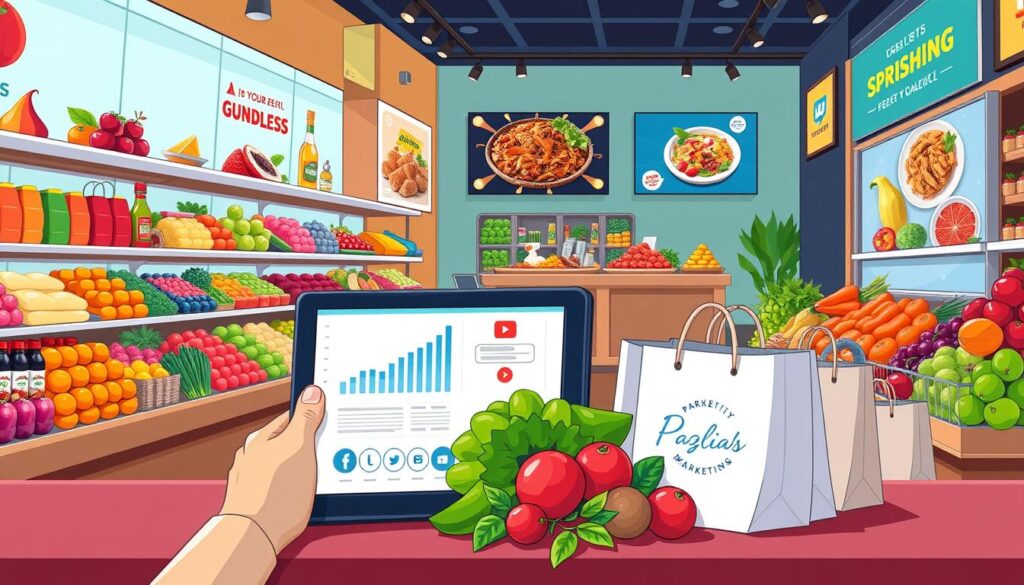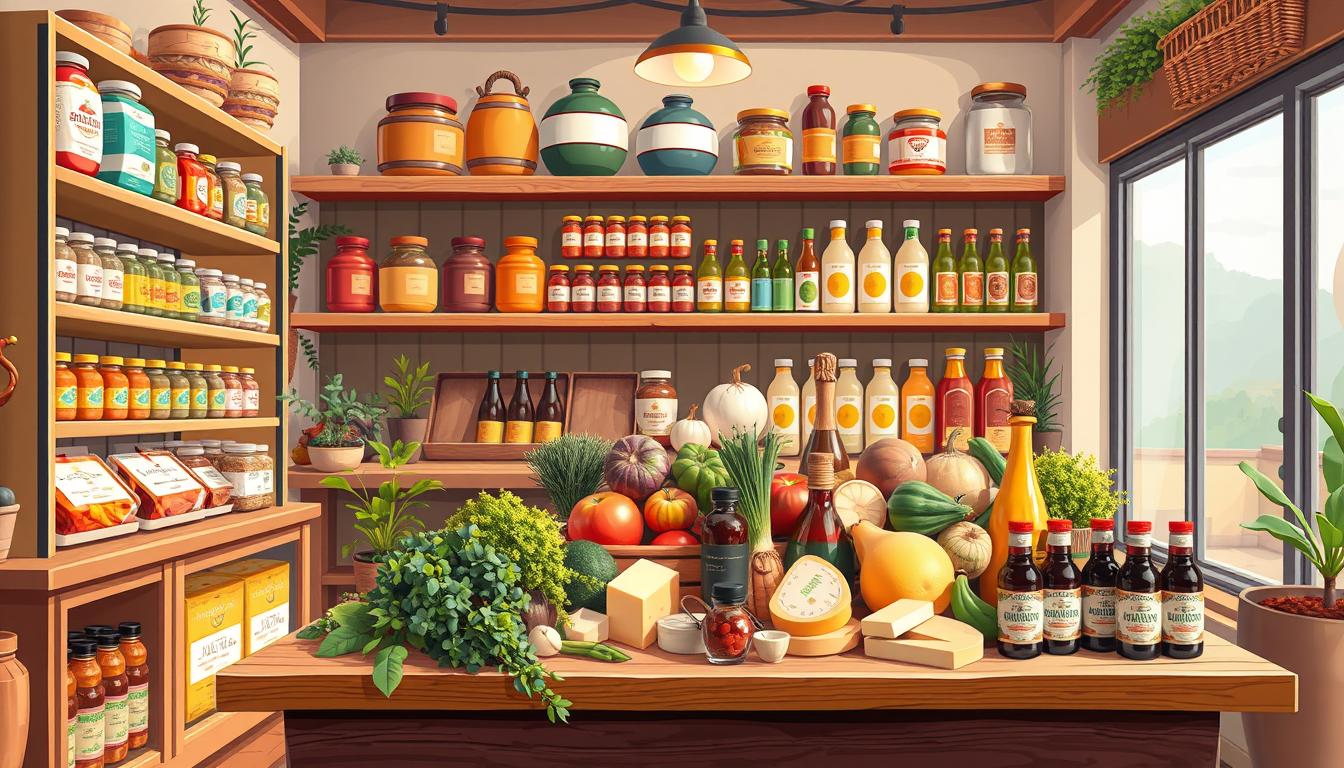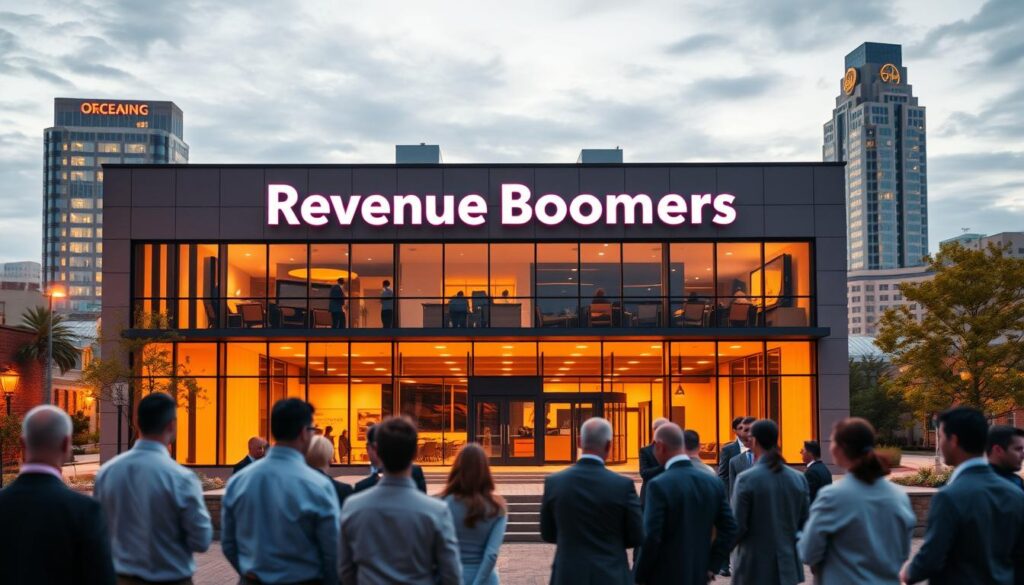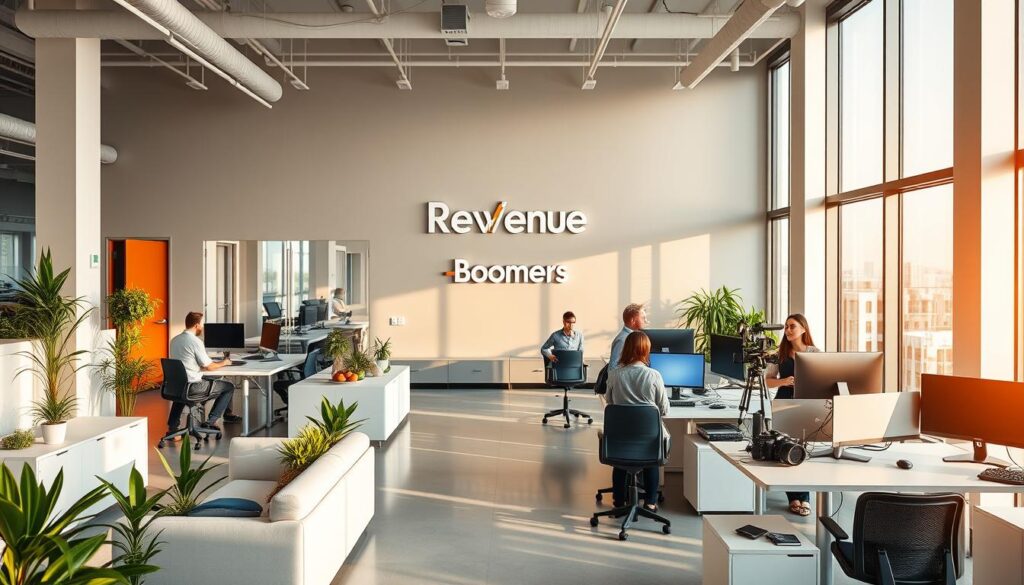Do you really get the art and science of marketing for specialty food stores? This fast-growing field is all about unique products and varied tastes. Good marketing is key to drawing in and keeping customers.
As the specialty food market grows, businesses need to offer special experiences and high-quality products. They must use digital marketing like SEO, social media, and email. With most people only looking at the first page of search results, SEO is crucial. Also, working with influencers can really boost your brand’s visibility and trust.
Learn how to improve your marketing for specialty food stores. Use analytics to make smart choices that boost your marketing. For more tips, check out this detailed guide.
Key Takeaways
- Specialty food businesses are among the fastest-growing sectors in the culinary world.
- Utilizing SEO is vital as most consumers rarely go past the first page of search results.
- Email marketing remains effective for maintaining direct communication and customer loyalty.
- Influencer collaborations can substantially enhance a brand’s reach and credibility.
- Data analytics offer invaluable insights into the effectiveness of marketing efforts.
- Creative packaging serves as a crucial first impression that can influence customer perceptions.
Understanding the Specialty Food Market
The specialty food market has grown a lot in recent years. This growth shows how consumer tastes are changing. People now want unique and high-quality food options.
As health and transparency become more important, it’s key to know what’s driving this change. This knowledge helps businesses meet consumer needs.
Key Trends Shaping the Industry
Sales of specialty foods have jumped from $88 billion in 2013 to $207 billion in 2023. This is a 149% increase. Now, specialty foods make up 21.6% of all grocery sales in center stores.
More people are looking for food that’s healthy and reflects their values. This means a move towards artisanal and unique products.
- 44% of primary store shoppers venture to secondary stores for specialty food items that their usual store lacks.
- Households spending on dedicated specialty stores contribute around $1,200 in annual sales.
- Specialty food items provide a gross margin return 3-4 times greater than mainstream products.
This change is not just about buying habits. It shows how consumer values are evolving. People want shopping experiences that are personal and engaging.
Retailers should focus on showcasing unique food products. They should integrate these items into their branding and store layout.
Consumer Preferences and Behavior
Consumers are looking for distinct and quality food items. This trend has led to specialty foods growing by 20% in the last 20 years. These products offer more than double the return on inventory compared to regular items.
Retailers should consider demographics when planning their stores. The rise of single households shows a change in how people view spending on specialty items. Working with smaller vendors can add variety to inventory, but managing financial expectations is crucial.
Knowing these trends is crucial for businesses wanting to meet consumer needs. For more on improving online presence, check out this guide on SEO for catering businesses.
| Trend | Impact |
|---|---|
| Growth in Specialty Food Sales | Sales increased from $88 billion in 2013 to $207 billion in 2023. |
| Consumer Preference for Quality | 44% look for specialty items in secondary stores. |
| Higher Profit Margins | Specialty items yield gross margin returns 3-4 times higher than mainstream. |
| Demographic Shifts | Growth of single households changing purchase behavior. |
Developing Your Unique Selling Proposition
Creating a unique selling proposition (USP) is key for specialty food store owners. It helps them stand out in a crowded market. A clear USP boosts your brand and attracts the right customers through niche marketing.
Knowing what makes your store special can draw in loyal customers. This is crucial for success.
Identifying Your Niche
Finding the right niche means knowing what your customers like. Surveys show personalization is now a big deal in sales. By focusing on a specific group, you can tailor your message better.
Trish Saemann from True North says this approach builds trust and keeps customers engaged.
Here’s how to find your niche:
- Study your competitors in the specialty food market.
- Find what makes your offerings unique.
- Know what your target customers want and like.
Brands like Ben & Jerry’s and Death Wish Coffee Co. show how unique offerings can boost your market position and loyalty.
Crafting Your Brand Message
Creating a message that speaks to your audience is essential. Use stories and clear communication to highlight your USP. Research shows in-person presentations are more effective than emails.
Focus on the benefits to your customers and be true to your brand.
Consider these elements for a strong brand message:
| Element | Description |
|---|---|
| Clear Messaging | Your message should be easy to understand, leaving no room for ambiguity. |
| Customer-Centric Focus | Address specific needs and pain points of your target market. |
| Authenticity | Be genuine in your approach to build trust and credibility. |
Use storytelling and passionate communication to make your store shine in niche marketing. Highlighting your uniqueness can deepen customer connections, boosting loyalty and sales. For more on personal branding, check out this guide.

Effective Digital Marketing Strategies
In the competitive world of specialty food stores, digital marketing for food retailers is key. It helps build a strong online presence. A user-friendly website is the first step, improving customer experience and satisfaction.
An optimized website showcases products and makes buying easy. This boosts sales and customer engagement.
Building a User-Friendly Website
A good website attracts and keeps customers. It should have a responsive design, easy navigation, and work well on mobiles. An updated online menu with great descriptions helps in search results.
High-quality food images make your site more appealing. They draw customers in with engaging visuals.
Leveraging Social Media Platforms
Using social media marketing lets stores share their stories and connect with people. Instagram and Facebook are great for showing off products and customer experiences. User-generated content boosts brand visibility and authenticity.
Sharing special deals on social media creates a sense of urgency. It attracts both new and existing customers.
Email Marketing for Customer Retention
Email marketing is vital for keeping in touch with customers. It lets businesses send personalized offers and updates. By controlling their lists, they can send messages at the right time.
Loyalty programs encourage repeat buys and help gather customer data. Regular newsletters keep customers informed and engaged.

These strategies help specialty food stores succeed in a digital world. For more on improving your online presence, check out this resource.
| Strategy | Description | Benefits |
|---|---|---|
| User-Friendly Website | Responsive design and easy navigation. | Improves customer experience, increases sales potential. |
| Social Media Marketing | Engagement through storytelling and visual content. | Enhances brand loyalty, attracts new customers. |
| Email Marketing | Direct communication with personalized offers. | Maintains customer retention, fosters loyalty. |
SEO Tactics for Specialty Food Stores
SEO is key for specialty food stores to get noticed and draw in local customers. It’s especially important for targeting people nearby who are looking for gourmet and specialty items. By using SEO strategies made just for their niche, stores can really stand out.
Importance of Local SEO
Local SEO helps specialty food stores connect with the community. It makes them more visible when people search for products in their area. By improving their Google My Business listings and encouraging reviews, stores can compete with big chains.
Most online searches start with a search engine. This shows why having a strong local SEO presence is crucial to get more people walking through the door.
Keyword Research Best Practices
Doing deep keyword research helps specialty food stores find out what people are searching for. Tools like KeywordsFX and keywordtool.io give insights into search volumes and competition. By focusing on specific keywords like “gourmet organic snacks,” stores can attract the right kind of traffic.
Long-tail keywords are also a good choice because they have less competition. Using these keywords in product descriptions and categories improves on-page SEO. This makes the store more visible and engaging for users.
Content Marketing Strategies
Content marketing is a great way to bring in traffic and build loyalty. Specialty food stores can use blogging to share content that speaks to their audience. Sharing recipes or hosting events can help connect with customers and make the store more visible in the community.
Combining SEO with content marketing creates a strong strategy for attracting customers. To learn more about SEO for restaurants and specialty food stores, check out this informative source.
| SEO Strategy | Description | Benefits |
|---|---|---|
| Local SEO | Optimizing for local search queries | Increased foot traffic and visibility |
| Keyword Research | Identifying high-impact, niche-specific keywords | Relevant traffic and higher search rankings |
| Content Marketing | Creating valuable content to engage customers | Stronger customer relationships and loyalty |
| Backlink Building | Developing a robust profile of external links | Improved domain authority and search ranking |
The Role of Influencer Marketing
Using influencer marketing for food products can really help your brand get noticed. By working with social media influencers who match your audience, you can make content that really speaks to people. This way, you can tell stories that grab attention and help people remember your brand.
Selecting the Right Influencers
Finding the right influencers is key to a successful campaign. Start by looking at who they follow to make sure they match your audience. Think about:
- Follower Engagement: Micro-influencers tend to have more interaction, which is great for local marketing.
- Content Quality: Choose influencers who make high-quality, real content that makes your food look good.
- Community Relevance: Work with local influencers to highlight your connection to the community and local food.
Companies like Wingstop have seen big gains by using influencer marketing. They’ve reached millions of people through food influencers. This approach creates buzz and gets people excited about your brand.
Measuring Campaign Effectiveness
Knowing how well your campaign did is important for future success. Set clear goals and KPIs to see how well your influencer partnerships are doing. Look at:
| Metric | Description |
|---|---|
| Engagement Rate | Check likes, comments, and shares to see how much people are interacting with your content. |
| Sales Volume | Watch how sales change when you run influencer promotions. |
| Brand Mentions | Keep an eye on how often your brand is talked about online. |
| Return on Investment (ROI) | Figure out how much money you make for every dollar spent on influencer campaigns. |
Since 69% of people trust influencer recommendations, measuring your campaign well is crucial. It gives you valuable feedback to improve your influencer marketing. This helps your food business grow by making smart, data-backed choices.
For more on creating content for influencer marketing, check out this useful resource.
Utilizing Analytics for Marketing Decisions
In the world of specialty food retailing, using analytics in marketing is key. It helps owners make smart choices based on data. This way, they can understand customer behavior, manage stock better, and change their marketing to meet new trends.
Tools for Tracking Performance
There are many tools to help grocery stores track important metrics. These tools look at what customers buy, their social media activity, and stock levels. No-code platforms make it easy for owners to get insights without needing to be tech experts. Some top tools include:
- Google Analytics: Tracks website traffic and behaviors of online shoppers.
- Tableau: Visualizes sales data, aiding in identifying trends and customer preferences.
- Microsoft Power BI: Offers robust reporting capabilities for performance analysis.
- Salesforce: Manages customer relationships while enabling tracking of purchase patterns.
- Shopify Analytics: Helps e-commerce retailers monitor sales and inventory performance.
Interpreting Data to Drive Strategy
Using these tools gives owners valuable insights. They can adjust their stock to cut waste and boost profits. They can also make checkout faster and train staff better to serve customers better.
Understanding what customers buy helps tailor marketing to different groups, like Hispanics and Baby Boomers. Retailers can use predictive analytics to guess demand based on seasons or local events. This helps them quickly change their products.
As more grocery stores see the value of analytics, they’ll make smarter, faster decisions. This will make their businesses more agile, responsive, and profitable.
| Analytics Tool | Key Features | Benefits |
|---|---|---|
| Google Analytics | Tracks website traffic and user engagement | Improves online marketing strategies |
| Tableau | Data visualization for trend analysis | Identifies customer preferences effectively |
| Salesforce | Customer relationship management | Enhances customer service based on data insights |
| Shopify Analytics | Sales and inventory monitoring for e-commerce | Optimizes online sales strategies |
| Microsoft Power BI | Robust reporting and data integration | Drives strategic decision-making through insights |
Choosing the Right Marketing Agency
Finding the right marketing agency for your food business can be a big deal. Revenue Boomers is a top choice for food brands. They know the specialty food market inside out. They offer digital marketing, brand storytelling, and social media services just for food businesses.
Working with an agency that gets your industry can really help your brand shine. It lets your business grow in today’s tough market.
Why Revenue Boomers Stands Out
Revenue Boomers is known for its smart strategies and real results. They focus on sustainability and being open, which appeals to today’s shoppers. This builds trust and sets your brand apart.
They work with many types of food businesses. This shows they’re experts and can help your brand reach more people.
Benefits of Professional Marketing Assistance
Getting help from a marketing agency offers many benefits. They make sure your marketing looks good and works well online. They improve your website, content, and social media.
This is important because more people find food ideas on Instagram and TikTok. Investing in these areas makes your brand more appealing. It also helps keep customers coming back and boosts sales.






